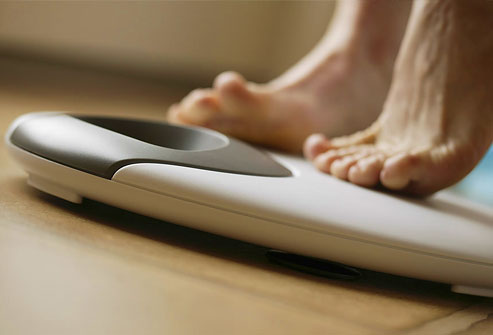Preparing for Weight-Loss Surgery

Preparing for weight loss surgery can be overwhelming. It can be extremely helpful to understand the process and know what to expect. Here are a few steps that will help you get off to a smoother start.
facing the mental health evaluation
 Before weight loss surgery we are required to face, what is for most of us, an extremely intimidating interview or evaluation with a psychiatrist.
Before weight loss surgery we are required to face, what is for most of us, an extremely intimidating interview or evaluation with a psychiatrist.
Why? Do they think we're crazy?
No...certainly not! Even though our sanity depends on a "little craziness" sometimes, it's doesn't mean there is anything to fear.
Obesity comes with it's share of years of being judged unfairly by others as undisciplined, with no self-control and maybe a little "crazy." But really, we're no different that the rest of the world. Our "crazies" just happen to be more obvious than some.
By that I mean...we just happen to turn to food for comfort and to cover a life-time of hurts, stresses, heartaches, pain and low self-worth, it doesn't mean we're crazy or any different than any one else.
It's really a starting point to help us identify life's stresses and how we can better manage them. Just as we have physical tests to help determine if we are ready physically, this evaluation is to determine our mental preparedness.
Weight loss surgery is a lifestyle change, which requires determination to change. Weight loss surgery is as much about "mindset" as physical compliance.
These professionals are there to help you return to health, they understand underlying issues that turn us toward our addictions and can offer solution toward healing. Rarely do these interviews result in decline of surgery, it should be a tool to help us find our way to health.
It will be helpful to have a plan for dealing with stress before the interview.
Asking yourself questions beforehand will help prepare you for the interview.
- Do I understand the lifetime commitment I are making to compliance with diet and exercise?
- Am I willing and ready to change my mind?
- Do I have a plan to deal with stress?
- Am I prepared with a plan to deal with addictive behaviors?
- Do I have a plan that will hep me not to transfer these behaviors over to other vices?
- Am I willing to get to the root of "what's eating me"?
This interview is for your benefit, you're going to make it through just fine...Yes, you can!
losing weight before surgery

Lose weight BEFORE surgery?
Now that's crazy!
There are several reasons why your surgeon wants you to lose weight prior to surgery.
Safety first
A medical study of 881 patients who had weight-loss surgery found that the more weight patients lost before surgery, the less likely they were to suffer post-op complications, such as infections, blood clots, and kidney problems.
In the study, pre operative weight changes varied among the 881 patients, ranging from modest weight gain to weight loss of more than 10 percent of excess body weight.
The post-surgery complication rate was nearly twofold higher in patients who gained weight before surgery relative to those who lost weight before surgery, Dr. Peter N. Benotti of the Saint Francis Medical Center in Trenton, New Jersey and colleagues report in the Archives of Surgery.
"Insider" information
The main purpose of losing weight before weight loss surgery is to reduce body fat in the abdomen region, especially in and around the liver. By reducing the size of the liver, the operating time for laparoscopic surgery is shortened and the procedure is safer. In some instances, a bariatric surgeon may postpone surgery if a patient's liver is too large. Now, a lesson in biology, your stomach is located just underneath your liver, so if your liver is smaller, it's more manageable to move during surgery, making surgery safer and faster.
Preparing for the after-surgery-lifestyle:
After weight loss surgery your lifestyle will be dramatically different than before surgery. This time before you undergo surgery, will serve to prepare your body for surgery, improve recovery, and increase the rate of weight loss. The time leading up to weight loss surgery is not the time to splurge on your diet and let your health worsen, but it’s the time to start making changes and preparing for the upcoming surgery and your new lifestyle change.
It's crazy, but the advantage is in your favor, the more you weigh the more it helps you lose.
Help with the impossible
This time, putting forth your best effort will reap great rewards. Hang in there, you can know that "surgical help" is on the way.
Prior to surgery, your surgeon will offer you help and advise on losing weight, nutritional counseling as well as preparing you (physically and mentally) for your pre-operative surgical needs and experience. Pre-op nutrition is a "must"... not just learning how to eat before surgery, but after surgery as well. More about pre-op diet go to "pre-op food phase".
Yes, you can, you have many more miles to go!
For more about the pre-surgery diet: see "pre-op food phase".
For more information on how your liver works, search an earlier blpg post entitled "know your liver".
learning as i go
 This blog is a collection of the experiences I've lived and the things I've discovered (and continue to discover) about Weight-Loss Surgery and maintaining my weight.
This blog is a collection of the experiences I've lived and the things I've discovered (and continue to discover) about Weight-Loss Surgery and maintaining my weight.
I have had some successes. I have made some mistakes. Mostly, I've learned the importance of the journey.
I am, and always will be—a work in progress. I invite you to come along with me as we find our way to wholeness.
Weight-loss surgery is a great tool that allows us to lose weight. The purpose of this tool is to speed up the process of weight loss and it works well. However, the key is to discover how to maintain that weight loss during the process.
The journey of losing weight after surgery has been more than just an alteration of my physical body, and I've shed more than physical pounds. For me, it has been a transformation from the inside out, from brokenness to wholeness in every area of my life.
Being set free from obesity is more than just learning how to eat and move, it's learning how to live. Along side the physical transformations have been changes in mindset. The entire process has been one that is leading me to find "what was eating me".
In the pages of this blog you will find experiences that have formed and shaped my healing process. Listed below is a summary of truths I believe that have been essential in initiating my recovery.
- First you must be ready to change. Change doesn’t come easy; it takes practice and well as a willingness to do so. The desire to be different must be stronger than your desire to stay where you are.
- Following the rules of your surgeon and nutritionist are essential in forming new healthy lifestyle habits. The goal of weight loss surgery is health. Weight-loss surgery is about returning to balance. We don't just need to lose weight, we need to keep it off. I believe that to reach optimum health, you must seek to understand the underlying causes of what led you to where you are and be willing to seek truths that will lead you into a better life.
- Overcoming obesity doesn't just require changes in the physical, but also in your mind and emotions. And for me, it also led to spiritual growth as well. Becoming free from obesity will not just happen with surgery, it is an ongoing and intentional process. Your outlook, mindset and core beliefs are at the center of these changes.
...of this I am confident...he who began a good work in me will carry it on to completetion until the day of Christ Jesus. Philippians 1:6.
the cost of living
 Most things in life come with a price. The price sets its value. Even things that can't be purchased with money have a price, including losing weight and gaining health. Beyond the O. R. there are other costs to consider with weight loss surgery aside from the monetary cost of the operation.
Most things in life come with a price. The price sets its value. Even things that can't be purchased with money have a price, including losing weight and gaining health. Beyond the O. R. there are other costs to consider with weight loss surgery aside from the monetary cost of the operation.
Surgery itself comes with risks. Afterwards, our success in this endeavor demands that we commit to follow up with appropriate medical care, take our vitamins, exercise, and learn to eat well.
Weight Loss Surgery is a tool. This tool just makes the job doable, but the doing is up to you. It can be summed up with making healthy lifestyle choices.
Patients, who reach their ideal body weight and improve their health, do so with hard work, diligent compliance and life long commitment. Losing weight after surgery will happen, but reaching your goal and keeping it off requires a life-style change. It’s all about setting your mind to the task and being willing to pay the price. It isn’t a diet you can quit when you get tired or don’t like it. It is a life-changing decision. Even lap-band surgery should not be looked upon as reversible. These changes are for life.
And life it is! Life and health. Life has so many great rewards. Surgery is the first step on the path to a rewarding and positive change. Your commitment to that change will be the key to losing weight and keeping it off. Are you willing to pay the price? The price for life and health will cost you something.
The goal is to reach health through balance, and a "normal" and regular healtlhy well - balanced meal plan.
Is the path you are on, giving you the results you desire? We pay a heavy price for being overweight, with life threatening diseases such as sleep apnea, high blood pressure, high cholesterol and diabetes.
Yes, there is a price to pay for regaining your life and health. Are you ready? You can do it….you have many more miles to go!
